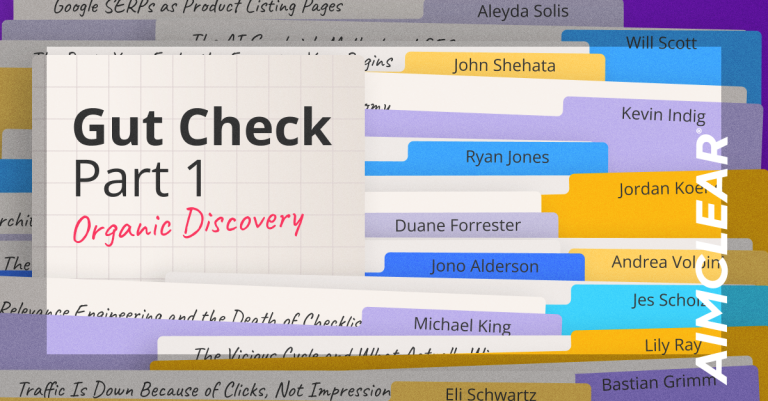SMX Advanced day one boasts a few hallmark (and highly anticipated) sessions: Mad scientists of paid search, SEO ranking factors, and of course the less-scripted and always entertaining AMA (or You & A) discussion. Danny Sullivan sat down with Google’s Webmaster Trends Analyst Gary Illyes to cover this year’s burning questions and concerns advanced SEOs have on RankBrain, HTTPS, AMP, Panda, Penguin, and more. Enjoy!
RankBrain
When asked to describe RankBrain and how it works, Illyes explained it is a machine-learning algorithm that identifies patterns and buckets data to help process search results. The new ranking signal will better understand what works for queries, especially when it comes to long-tail queries and queries Google has never seen before. Example: If someone searched, “can I beat Mario brothers without using the walkthrough?” without RankBrain, a user might not get relevant results that satisfy their question. With RankBrain, more reasonable results can be sent to a user that better satisfies their query.
After being pressed on optimizing capabilities for RankBrain, Illyes clarified it is about making sure the user gets the result deserved for the query ” there is no SEO or optimization possible as there is no RankBrain score (though it is still a ranking factor).
Google Assistant
“We’re still trying to wrap our heads around what it should look like,” said Illyes when asked to expound on the state of Google’s latest machine-learning virtual assistant tool. When Sullivan questioned how much of the search algorithm will be replaced by machine learning, Illyes said there is still work to be done in making sure every type of query can be satisfied. Google doesn’t want to get to a stage where someone sends them a bad query, which beget bad results because of machine learning (think the movie ‘Her’).
TLDs
There has been much ado recently surrounding TLDs and what exactly Google looks at in domain names. Illyes set the record straight by stating TLDs do not play a role in relevancy for a specific piece of content or URL. Country TLDs (CLTDs) can play a role in queries in specific countries for local, and having your brand name or product in the domain can help (because it helps the user find what they want easier) ” however, buying up spammyguy.news/latest certainly won’t help your cause (especially if you’re a spammy guy).
Search Console Data
Remember that time in 2013… Google said it was going to extend Search Counsel data to 90 days? So does everyone else. While Illyes wouldn’t commit to a rollout date, he did say the team is working on it, and more data may be coming to webmasters.
Penguin
When joked whether a Penguin update will be released before Elon Musk lands on Mars (but seriously), Illyes said the team is working on it, but declined to provide a timeframe as they’ve been wrong too many times before and it’s not good for business. Penguin (the 2012 update designed to punish pages spamming Google search results) was last updated in 2014 for those counting or still licking their wounds.
Panda
Panda (part of Google’s content quality algorithm) is a slow, continuously running update, not real-time. Illyes stated it takes months to crawl through all the pages in the web, score a site, then roll out to the index.
HTTPS / HTTPS2
Illyes shared that around 30 percent of pages are now using HTTPS. Google is looking at whether they can strengthen the rank boost for secure, but at this point it won’t happen anytime soon as they don’t want to sacrifice relevancy.
When it comes to HTTPS2, however, Illyes warns that it is still relatively new and if you’re thinking about implementing, make sure you can downgrade back to HTTPS. There are still browsers that cannot handle it and you could be shooting yourself in the foot if you can’t get back to HTTPS.
Mobile
Following Mobilegeddon 2 in May 2016, Illyes does not believe there will be a second one. Though he did say Google is working on iterations and may add more signals, as page speed is more important on mobile than desktop.
Social Signals and Authorship
Ilyes confirmed that when it comes to social signals, Google still does not take into account Facebook likes or retweets, as they don’t want to rely on something that someone could pull the plug on (like Google+). He also confirmed that although Google stopped using authorship markup in 2014, they have officially killed off authorship even for in-depth articles.
AMP, Bots, and User Experience
As the session came to a close, Sullivan asked, “What is the most overlooked feature that SEOs need to pay attention to?” Illyes quickly replied, AMP (Accelerated Mobile Pages). “It’s going to be big,” he said, and also recommended preparing resources to implement. Illyes also suggested adoption of chatbots and assistants increase, as it’s important for webmasters to be in the know.
To improve user experience, Illyes discussed the importance of content and social media. “Make sure people know about you (in social media, not ads), and write content. Let users know you have content on social. For UX, make sure that pages load frickin’ fast… real fast. Median load time for AMP is below one second, and that’s what users expect,” he said.
With that, the session (and day one) concluded with a few questions from the audience, a traditional crowd selfie, and a swarm to the podium and expo hall reception. Check back to the blog for day two coverage from SMX Advanced!









